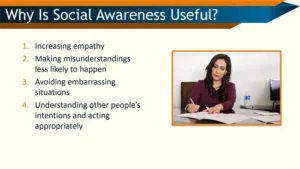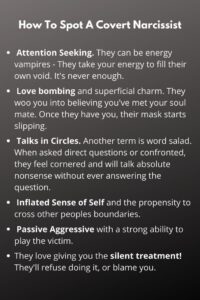Word-Of-the-Week #977: Social Awareness
April 27, 2023 by Susan Clarke · Comments Off on Word-Of-the-Week #977: Social Awareness
Social Awareness – having an awareness and understanding of the world around us.
Have you ever stopped to think about the importance of understanding those around you? How they feel, what they are thinking, or how your actions impact them?
This week features the second half of “If you use these 13 phrases every day, you have higher emotional intelligence ‘than most people’: Psychology experts say,” by Kathy and Ross Petras, Contributors at Makeit.com.
- “Great job!”
Showing appreciation goes a long way. It acknowledges other people’s efforts and accomplishments.
When you compliment someone, you immediately set up a positive vibe. Saying “I appreciate you” makes others appreciate you more.
- “You both have good points. Let’s see how we can work together.”
This phrase can help you diplomatically work through trouble spots by acknowledging differing points of views.
Once you’ve encouraged everyone to share their concerns, you can more easily solve a potential problem. Studies show that the ability to resolve conflicts is a trademark of emotional intelligence.
- “I’d love your input on this.”
This phrase, and similar ones like “Can I get some advice from you?” or “Do you mind if I ask for some input?”, are golden.
You’re allowing someone else to feel proud of themselves, which makes them think very positively about you.
- “This situation makes me worried [or confused or upset].”
When there is a problem, emotionally intelligent people don’t focus on the person who created it, but on the overall situation.
This way, you’re not blaming someone or putting them on the defensive side. Instead, you’re explaining how you feel about what happened, which helps you avoid sounding passive-aggressive or antagonistic.
- “I feel this way about…”
When you’re emotionally intelligent, you connect with your emotions as they happen, in the moment.
This type of self-awareness allows you to better share your own emotions and impressions with other people, which both makes them feel closer to you and encourages them to do the same.
- “I’m sorry.”
Having a healthy dose of humility is common among people with high emotional intelligence. Don’t be afraid to say “I’m sorry.” When you make a mistake, admit it and genuinely apologize to whomever deserves it.
- “Thank you!”
Don’t forget those “magic words” you were taught when you were a kid. “Please,” “thank you” and “you’re welcome” are always appreciated.
Common courtesy is, sadly, not that common these days, according to studies. Being polite isn’t only a mark of high emotional intelligence, it’s also a way of showing respect for others, which makes them regard you more highly.”
This week’s focus is on Social Awareness. Are you able to understand how another person is feeling, empathize with them, and take a different perspective on a situation? Can you push your own opinions and judgments aside and truly listen to the views of someone else?
I LOVE feedback! Join my Facebook community on my FUN-damentals Fan Page.
Word-Of-the-Week #976: Emotional Intelligence
April 20, 2023 by Susan Clarke · Comments Off on Word-Of-the-Week #976: Emotional Intelligence
Emotional Intelligence –AKA EQ is the ability to identify and understand emotions — both your own and the emotions of others.
Did you know that it’s you EQ not your IQ that counts? Did you know that your IQ gets you hired but that your EQ gets you promoted?
This week features the first half of “If you use these 13 phrases every day, you have higher emotional intelligence ‘than most people’: Psychology experts say,” by Kathy and Ross Petras, Contributors at Makeit.com.
“Do you have a knack for connecting with people? Emotional intelligence is the ability to identify and understand emotions — both your own and the emotions of others.
Research has shown that this is a rare and valuable asset. Emotional intelligence can help you build and strengthen relationships, defuse conflict, and improve overall job satisfaction.
Psychology experts say that if you use these 13 phrases every day without even thinking about it, you have higher emotional intelligence than most people:
- “Could you tell me more about that?”
People who lack self-awareness only care about their own thoughts and opinions. But emotionally intelligent people are interested in how others feel and what they have to say.
Communicate in a way that encourages people to talk about their feelings and experiences, and use their responses as a learning opportunity.
- “I hear you.”
By telling someone that you understand them, you set up a cooperative environment perfect for team-building.
Other similar phrases like “I see what you mean” and “I get what you’re driving at” signal that you’re truly listening and opens up the lines of communication.
- “I understand what you’re saying, but…”
This phrase highlights another important aspect of emotional intelligence: the ability to act diplomatically when dealing with difficult people and situations.
If you disagree with someone, express it in a tactful, non-confrontational way. The goal is to make it easier to arrive at a mutually agreeable solution.
- “How do you feel about that?”
To make people feel acknowledged and respected, pay attention and take time to understand and empathize with them. As you listen, make an effort to put yourself in their shoes in a meaningful way.
- “I’m not sure what’s wrong. Could you explain the problem?”
With this phrase, you know that someone is having an issue, and instead of reacting negatively, you invite them to share their thoughts.
Similar alternatives: “Can you clarify that for me?” or “What I’m hearing from you is that [X]. Is that right?”
- “What do you mean?”
When you ask someone for clarification, you are asking them to say something in a different way or provide more information so that you understand them better. This is different from asking a person to repeat something.
This week’s focus is on Emotional Intelligence. Are you interested in how others feel and what they have to say? Would you like to build and strengthen relationships, defuse conflict, and improve your overall job satisfaction?
I LOVE feedback! Join my Facebook community on my FUN-damentals Fan Page.
Word-Of-the-Week #975: Narcissist
April 13, 2023 by Susan Clarke · Comments Off on Word-Of-the-Week #975: Narcissist
Narcissist – excessive love or admiration of oneself.
Is there anyone in your life that continually puts you down, makes you feel small and batters your self-esteem?
This week features excerpts from “35 Phrases To Disarm a Narcissist and Why They Do the Trick, According to Therapists.” Here’s exactly how to handle confrontations with a narcissist,” by Parade columnist Shelby Deering.
“All of us deal with difficult people in our lives, no matter who we are or who we choose to keep in our circle. But sometimes, that difficulty can reach a whole new level, and there may be someone who continually puts you down, makes you feel small and batters your self-esteem.
These individuals are called narcissists. In fact, narcissism is a diagnosable condition. It’s called Narcissistic Personality Disorder (NPD), and experts estimate that around 5% of people have this disorder.
“A narcissist is someone who has a very fragile sense of self and operates with a subconscious (but debilitating) fear of not being good enough,” says Alena Scigliano, licensed psychotherapist, author, speaker and clinical expert on narcissistic abuse.
This may come as a surprise since narcissists will act superior to those around them, but deep down, they don’t feel good about themselves. Scigliano explains that as a means of survival, narcissists will develop “defense mechanisms and offense tactics,” which are both part of narcissistic abuse.
That’s why it’s key to be ready with phrases to disarm a narcissist. Whether you’re in the throes of a heated confrontation, being barraged with insults yet again or simply want to respond to an underhanded comment said during an everyday conversation, these phrases will empower you and take the narcissist down a peg (or a whole lot more than just a peg).
- What Are the Signs That Someone Is a Narcissist?
“There are many signs⎯what I call red flags⎯that someone is a narcissist,” says Scigliano. “However, the most important thing to know is that one flag does not mean someone is a narcissist. The key to determining that someone is a pathological narcissist is recognizing a pattern of multiple red flags.”
To determine if your partner, family member or friend is a narcissist, pay close attention to how this person treats those with whom they spend the most time. Do they tend to be narcissistically abusive toward one or more of those people?
Scigliano defines narcissistic abuse as a form of psychological abuse that uses dysfunctional manipulation, among other abusive tactics, to control others in order to elicit specific reactions or create circumstances that serve the needs of the narcissist—often to the detriment of others.
Jaime Mahler, LMHC, is a licensed clinical psychotherapist and shares these common traits seen among narcissists:
Low empathy or no empathy
Entitlement
Love is viewed as transactional (“What’s in it for me?”)
Relationships are viewed as tools to manipulate others
Fear of losing control over a situation, over a person or over people’s perceptions
Consistent lying/omission of truth
Seeking power positions within a family, workplace, in their religions or their businesses
Gaslighting (telling someone what they are experiencing or feeling isn’t happening/did not happen)
No respect for others’ boundaries
Lacking personal accountability
A narcissist can greatly impact your life, and typically not for the better. First of all, Scigliano says that being manipulated and controlled by another person engenders a constant sense of fear.”
This week is about knowing what a narcissist is. Do you know anyone who constantly acts superior to you or others? Do you know anyone who exhibits any of the common traits listed above?
I chose to use excerpts because of the length of this article. If you’re interested in reading the whole article click here.
I LOVE feedback! Join my Facebook community on my FUN-damentals Fan Page.
Word-Of-the-Week #974: Relationship
April 6, 2023 by Susan Clarke · Comments Off on Word-Of-the-Week #974: Relationship
Relationship – a state of connectedness between people (especially an emotional connection).
Have you created any new relationships in the last year? How diverse is your “social portfolio?
This week features “Why you should consider going to that high school reunion,” by San Diego UT columnist Neil Senturia.
“I have a high school reunion coming up in a few months. There is zero chance of my sharing the number, but the question is, should I go? Statistically, about 30 percent of a graduating class attend reunions. And as you all know, there is a certain self-selecting relationship here, namely that the most successful people tend to be the ones that go to the most reunions.
However, regardless of net worth, not going might be missing out on a valuable opportunity. Harvard professors Michael Norton and Alison Wood Brooks have some advice on the subject of our need for partners, acquaintances, colleagues and friends.
Their thesis is that people need to think about investments in social relationships the same way they think about stocks and bonds — the importance of diversification. Norton says that spending time with family members and close friends is “positively associated with well-being.” Save for the occasional maniac brother-in-law.
On the other hand, he says that “interactions with random strangers can sometimes make us happier than interacting with our partner or spouse.” The reason for that is you already know the buttons not to push, and all is smooth.
Norton goes on, “The variety that being with strangers provides can push us to make more of an effort and can spark new connections.” At networking events, the tendency is to gravitate to those we already know, but the potential for real value is to reach out to strangers. You have to work at participating and by effort, increasing a more diverse “social portfolio.”
There is a curmudgeonly and famous Stanford professor, Jeffrey Pfeffer, who says that “people to whom you are weakly connected are more valuable than those to whom you have strong connections.” He argues that we need to engage with “non-redundant information,” which is the kind you often get from strangers, and not from the usual suspects at the golf club or Rotary.
Now, to the crux of the matter of the reunion. Here is the story. Two members of my graduating class of 65 boys, (no girls, which explains everything, but that is for another column) decided to ask the members to recount their lives since high school, and they gathered about 50 mini autobiographies. They published them in a small book. (New York Times best-seller list, fear not.)
Rule No. 218: Grand passion and relentless pursuit will take you further than good grades.
The distribution of stories was fascinating. As you would suspect, the guy who was the genius became a famous eye doctor, the guy who was a member of the lucky sperm club bought a baseball team, but the “road less traveled guys,” the ones who did not excel academically, who didn’t win any awards or notice during their stay, pleasantly surprised me. Even the ones who had ignored or tormented me.
When I read about their lives, many of them ended up successful and happy. Not Wall Street titans and not captains of industry, but fulfilled, with wives, partners, children. The stuff of life. Their stories had a balance of enough economic success with a wide diversity of life choices and experiences. They were at peace with their journey.
At one of the earlier reunions, I spent a lot of time with a couple of these “not my gang” folks, and their thoughts on multiple topics fascinated me. I was not listening in an echo chamber. I was pushed out of my comfort zone. I came away from the interactions surprisingly feeling better about the world and the people in it.
The point being made by both Norton and Pfeffer is that we need to create interactions that are both “old acquaintances” as well as the local barista, the person at the library, the construction worker on your street.
Norton says, “an hour here or there” will surprise you and add some happiness. Personally, I love the random interaction. I can learn a person’s whole life story in a ride down an elevator (high rise), if I ask the right question and listen.
And as to that reunion, I am going. There are a couple of jerks I am looking forward to seeing again and rubbing their nose in it.
“When I was in junior high school, the teachers voted me the student most likely to end up in the electric chair,” — Sylvester Stallone.
This week is all about relationships. Have you ever had an interaction with a random stranger that sparked a new connection? Has there ever been a time that you were pushed out of your comfort zone and actually came away with a positive feeling? How many investments have you made in social relationships over the past year?
I LOVE feedback! Join my Facebook community on my FUN-damentals Fan Page.





